Overview
The article titled "10 Different Programming Languages and Their Uses Explained" begins by addressing the coding challenges developers face in a dynamic tech environment. It identifies various programming languages and their specific applications in software development, illustrating how languages like Python, Java, and C++ serve distinct purposes. Furthermore, it highlights their roles in web development, data analysis, system programming, and game development, showcasing their versatility and relevance. In addition, the article emphasizes the importance of understanding these languages to improve productivity and code quality in today's landscape. Readers are encouraged to reflect on their coding practices and explore the diverse functionalities of these programming languages.
Introduction
In the rapidly evolving landscape of software development, developers often face significant challenges in selecting the right programming languages and tools that can impact a project's success. Have you ever struggled with automating API documentation or optimizing your coding practices? Kodezi offers a solution, empowering developers to streamline their workflows and enhance productivity. By harnessing the power of tools like Kodezi, you can automate tasks and improve the quality of your code.
Each programming language, from Python for data analysis to JavaScript for interactive web applications, presents unique advantages tailored to specific needs. Understanding these strengths is crucial as developers navigate the complexities of creating scalable applications. Furthermore, languages such as Java, C#, and Rust play pivotal roles in modern development, each contributing to different aspects of software engineering.
This article explores the applications and benefits of these programming languages, alongside the innovative tools that enhance coding efficiency. In addition, we will delve into how Kodezi can help you overcome common coding hurdles, ultimately equipping you with the knowledge to thrive in an increasingly competitive tech environment. Whether you're building interactive applications or optimizing performance in system-level programming, the insights provided here will guide you toward improved coding practices and greater success.
Kodezi | Professional OpenAPI Specification Generator - AI Dev-Tool: Streamline Code Generation and Debugging
Developers today face significant challenges in coding, particularly when it comes to managing and maintaining APIs. This advanced platform, Kodezi, automates the creation of OpenAPI specifications, greatly easing the process for those responsible for API development. By utilizing AI-driven tools, Kodezi streamlines code generation and debugging, allowing programmers to concentrate on feature development rather than getting bogged down in documentation. This efficiency is crucial, especially in complex projects where high-quality code is paramount.
How does Kodezi address these challenges? The impact of automated documentation tools on developer productivity is profound; studies indicate that generative AI can enhance knowledge transfer and onboarding by 44%. Furthermore, Kodezi's robust debugging capabilities swiftly identify and resolve issues, fix performance bottlenecks, and ensure that code meets professional standards. This is particularly advantageous for teams navigating intricate projects, fostering a culture of quality and efficiency.
The benefits of using Kodezi extend beyond mere productivity improvements. However, it is important to recognize that generative AI is least helpful when problems become complicated and the big picture needs to be taken into consideration. Practical instances demonstrate the transformative impact of AI-powered code creation in API design, highlighting how such tools can revolutionize workflows. As the landscape of API development evolves, the integration of automated OpenAPI specification generation tools is becoming increasingly vital for maintaining a competitive advantage. Additionally, automated metrics collection can minimize reporting overhead when measuring AI implementation impact, further enhancing Kodezi's effectiveness in driving productivity and innovation. Why not explore the tools available on the platform today?
Python: Versatile Language for Web Development and Data Analysis
Python is renowned for its simplicity and readability, making it an excellent choice for both novice and seasoned developers. However, have you considered the challenges that come with coding? While specific statistics on Python usage in 2025 are not available, it is widely recognized as a leading language in data analysis and web creation. Its frameworks, such as Django and Flask, facilitate rapid software construction, allowing developers to create scalable web applications efficiently.
In addition, Python shines in the realm of data analysis and machine learning, equipped with powerful libraries like Pandas and NumPy that enable intricate data manipulation and analysis. Real-world applications of Python in these domains are extensive, ranging from data visualization to predictive modeling. As security-first coding practices gain traction, Python's role in machine learning continues to expand, aligning with the latest industry trends, including the adoption of DevSecOps and shift-left security practices.
Furthermore, the ongoing evolution of Python frameworks reflects the language's adaptability to modern programming needs. For instance, case studies such as Itransition's consulting services illustrate how Python can optimize technological processes, leading to reduced costs and increased revenue. Python remains a cornerstone in the programming landscape due to its capacity to support different programming languages and their uses, ranging from simple scripts to complex data-driven solutions. Are you leveraging Python's capabilities to enhance your projects? Expert insights underscore Python's critical role in machine learning, emphasizing its importance in today's programming environment.
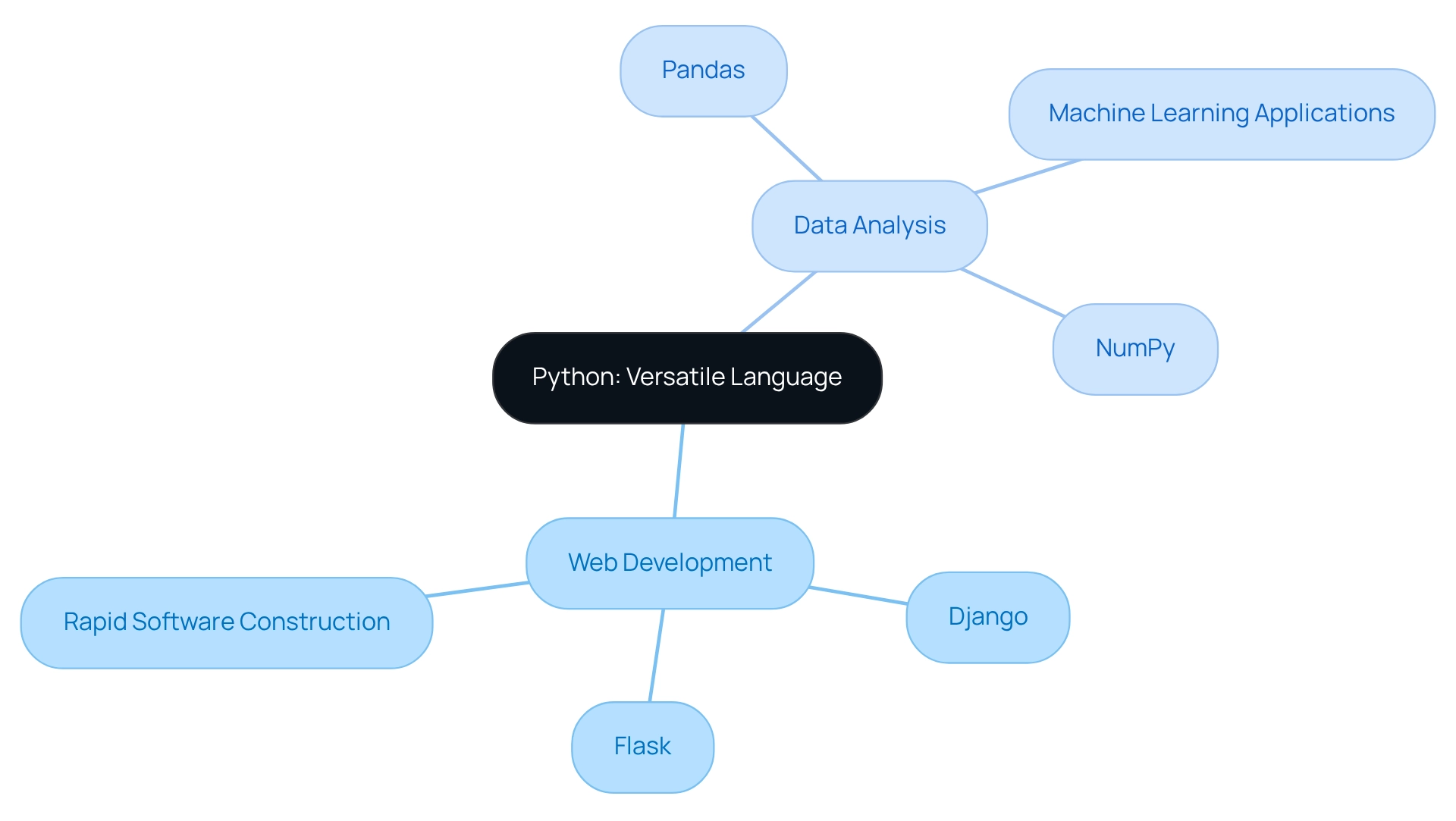
Java: Key Language for Enterprise Solutions and Android Development
In the world of software development, coding challenges are a common hurdle that many developers encounter. How can programmers effectively address these issues while maintaining high standards of code quality? Enter Kodezi, a powerful ally for Java programmers that offers automated code debugging, enabling quick issue resolution. With Kodezi, programmers can promptly recognize and address problems within their codebase, gaining thorough explanations and insights into what occurred and how it was rectified. This capability ensures compliance with the latest security best practices and coding standards, ultimately improving code quality and optimizing performance.
Furthermore, as highlighted in the case study 'Go with Java for Your Next Big Creation Project,' Java's reliability and rich ecosystem make it a preferred choice for developers. Kodezi enhances this by providing features that empower creators to build efficient and adaptable software. The robust community support and ongoing evolution of Java guarantee its significance, making it an essential skill for professionals aiming for enterprise environments or mobile development. Real-world examples abound, with major companies relying on Java for their digital transformations, underscoring its importance in the tech landscape of 2025.
As Shachi Dixit, Senior Engine Optimization Lead at Uplers, observes, 'Java's scalability and portability make it a favored option for programmers seeking to create efficient and adaptable applications.' In addition, Java's extensive ecosystem includes IDEs like IntelliJ IDEA, Eclipse, and NetBeans, providing programmers with robust tools to enhance their productivity. With Kodezi's capabilities, programmers can further elevate their coding skills and productivity, making it a versatile tool in their programming arsenal. Why not explore the tools available on the Kodezi platform and discover how they can transform your coding experience?
JavaScript: Essential for Interactive Web Development
JavaScript serves as the backbone of contemporary web development, empowering developers to create interactive and dynamic user interfaces. As a cornerstone of front-end development, it is also gaining traction on the server-side, particularly with Node.js. In 2025, approximately 95% of websites are anticipated to utilize JavaScript, with frameworks like React and Angular leading the evolution of web development. These frameworks enable the creation of single-page applications, providing seamless user experiences that are vital in today’s digital landscape.
Furthermore, 30% of programmers are now integrating JavaScript frameworks into their workflows, underscoring their growing significance in the industry. The software development market is projected to expand at a compound annual growth rate of 22.54% from 2020 to 2027, highlighting the relevance of JavaScript and its frameworks in this burgeoning field. Mastering JavaScript and its frameworks is crucial for individuals looking to excel in web development, as they play a pivotal role in shaping the future of interactive applications.
In addressing the challenges developers face, tools like Kodezi can significantly enhance the coding process. By offering automatic code correction and bug analysis, Kodezi allows programmers to focus on creativity and efficiency. Unlike Copilot, which primarily provides code completion, Kodezi functions as an autocorrect utility for code, assisting programmers in debugging and resolving coding issues effectively. This platform supports over 30 programming languages, making it a versatile tool for various coding environments.
As Ma. Lorena Gumafelix Emperado, an experienced content writer, emphasizes, 'Keeping abreast of the latest technologies is essential for programmers to stay competitive in the constantly changing tech environment.' With Kodezi, programmers can also leverage the Kodezi CLI to auto-heal codebases, streamlining their workflows and boosting productivity across diverse projects. Have you considered how such tools can transform your coding practices and enhance your efficiency?
C#: Preferred Language for Windows Applications and Game Development
C# is an essential programming language among the different programming languages and their uses, created by Microsoft, primarily utilized for developing Windows software and games. As the preferred language for Unity, one of the leading game creation engines, C# exemplifies the different programming languages and their uses by empowering developers to efficiently create cross-platform games. Its robust typing and object-oriented characteristics are particularly advantageous for large-scale projects, ensuring both maintainability and scalability. Furthermore, the integration with the .NET framework enhances its capabilities, providing a strong environment for programming. Notably, .NET Core introduces a more modular strategy, enabling greater flexibility and cross-platform features, which effectively addresses the needs of different programming languages and their uses. In 2025, approximately 70% of Windows applications are projected to be developed using C#, highlighting its dominance in the market. Additionally, C# has gained significant traction in game development, illustrating the concept of different programming languages and their uses, with a considerable number of games created in Unity leveraging this language. Real-world examples illustrate C#'s effectiveness in crafting immersive gaming experiences, particularly in areas such as virtual reality and mobile gaming.
Developers frequently praise C# for its user-friendliness and robust features, noting that it simplifies the game creation process. With tools like the CLI, teams can auto-heal codebases in seconds, eliminating delays associated with pull requests and allowing developers to focus on creation rather than troubleshooting. Kodezi CLI serves as a multifunctional tool for programmers, enhancing productivity and efficiency in C# programming. Unity's continuous evolution further solidifies C#'s relevance, with trends indicating an increasing demand for C# skills in the gaming industry. Moreover, proficiency in C# can unlock career opportunities by understanding different programming languages and their uses in fields such as virtual reality, mobile applications, and game design. As the landscape of Windows software and game creation evolves, mastering C# remains critical for developers aiming to excel in these domains. As a reminder, this content is provided for informational purposes only. Learners are encouraged to conduct further research to ensure that courses and credentials pursued align with their personal, professional, and financial aspirations.
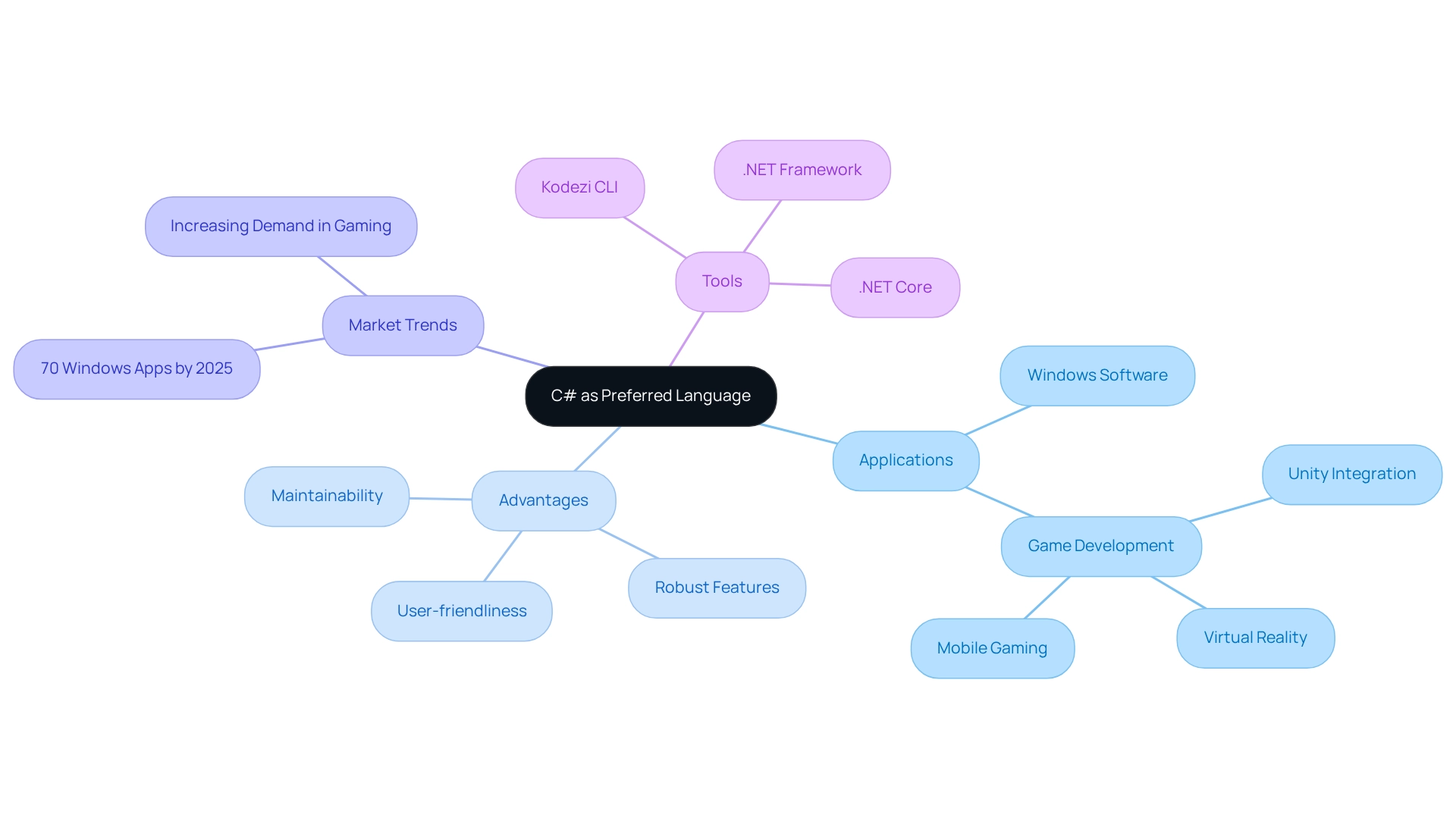
C++: Powerful Language for System Programming and Game Development
C++ stands out as a robust programming language, celebrated for its fine-grained control over system resources. This quality makes it a top choice for system programming and high-performance applications. As we look ahead to 2025, C++ continues to dominate the game development landscape, with approximately 70% of games utilizing it due to its unmatched performance features and real-time processing capabilities. The language accommodates both procedural and object-oriented programming paradigms, enabling programmers to select the most suitable approach for their projects.
Furthermore, C++ is integral to renowned game development frameworks like Unreal Engine, empowering creators to craft visually stunning and resource-efficient games. Recent trends indicate an increasing reliance on C++ for high-performance applications, especially in sectors that require rapid data processing and complex algorithm implementations.
In addition to its programming strengths, developers can enhance their productivity with Kodezi Code, a versatile tool designed to streamline coding processes. Kodezi Code offers features that assist in code generation, debugging, and optimization, making it an invaluable resource for C++ developers aiming to improve their workflow.
Have you considered how C++ is utilized in AI creation? Its efficiency in managing data and executing algorithms is crucial in this field. Developers often select different programming languages and their uses for AI based on their capabilities in data management, algorithm design, and model construction. For instance, many prominent AI tools rely on C++ for model creation and data handling, showcasing its versatility across various domains.
Industry experts consistently emphasize C++'s performance in gaming. One expert noted, "C++ remains the backbone of game development, providing the speed and efficiency that modern games require." This perspective aligns with Tom DeMarco's definition of estimation, suggesting that C++'s performance represents the most optimistic prediction with a non-zero probability of success in the gaming industry. As the programming landscape evolves, C++ continues to be an essential resource for programmers striving to build high-performance applications and engaging gaming experiences.
Moreover, the Standard Template Library (STL), originally crafted by Alexander Stepanov, has been foundational in C++ programming. It offers programmers a powerful set of tools for generic programming. As we advance into 2025, C++ remains at the forefront of programming languages, adapting to the latest trends while maintaining its relevance in both system programming and game development. By leveraging Kodezi Code, programmers can further enhance their coding efficiency and effectiveness in C++ projects.
SQL: Fundamental for Database Management and Data Manipulation
SQL (Structured Query Language) is a foundational tool for managing and manipulating relational databases, enabling programmers to perform essential operations like querying, updating, and deleting data with precision. In 2025, SQL remains a crucial skill for programmers, especially in data-driven environments where effective data analysis and reporting are paramount. Did you know that approximately 70% of programmers use SQL for data analysis? This statistic highlights SQL's widespread adoption and relevance in today's tech landscape. Furthermore, the software engineer engagement rate with popular technologies worldwide in 2023 underscores SQL's ongoing significance.
Mastering SQL not only facilitates seamless interaction with databases but also empowers programmers to ensure systems can efficiently retrieve and manipulate data as required. Expert opinions increasingly emphasize the necessity of SQL proficiency, with many data analysts pointing out its role in deriving insights and making informed decisions. As Hilary Mason, a well-known data scientist, aptly states, "At the core of data analytics and data science is curiosity and learning; finding patterns, telling stories, and deepening your understanding of the world around you." This perspective reinforces the critical importance of SQL skills in the analytical process.
Key operations performed using SQL encompass:
- Data retrieval through SELECT statements
- Data manipulation with INSERT, UPDATE, and DELETE commands
- Executing complex queries that aggregate and filter data
As we advance through 2025, trends indicate a growing focus on SQL's integration with cloud services and big data technologies, further solidifying its importance in the realm of database management and data manipulation.
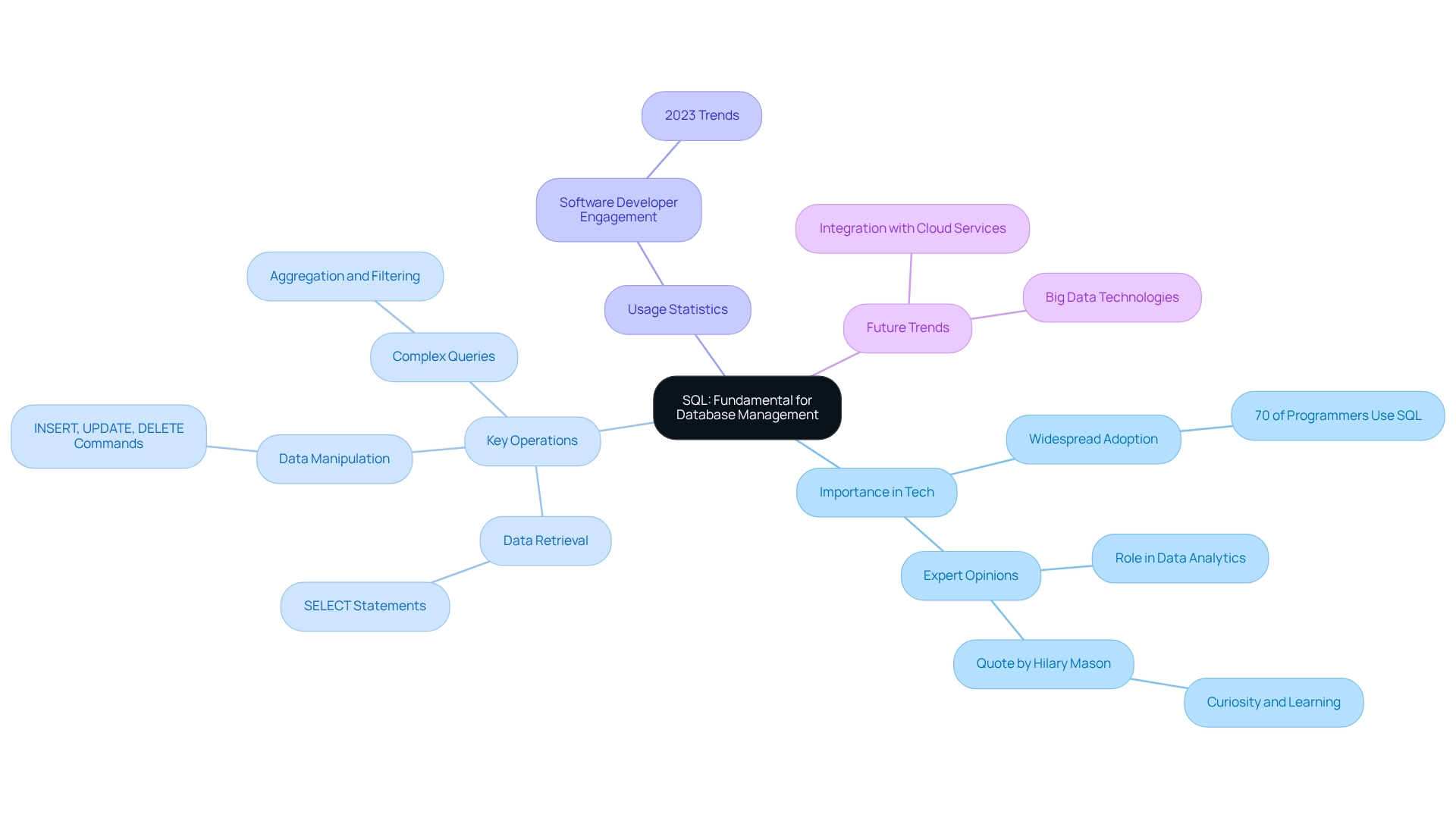
Go: Efficient Language for Scalable Web Applications
Go, or Golang, is a statically typed programming language created by Google, known for its simplicity and efficiency compared to different programming languages and their uses. It excels in creating scalable web solutions and microservices, which highlights the effectiveness of different programming languages and their uses, largely due to its robust concurrency support and rapid execution speed. With a clean syntax and a powerful standard library, Go allows programmers to create resilient applications swiftly.
In 2025, Go continues to gain traction in cloud computing, with a significant percentage of programmers adopting it for microservices. Approximately 70% of programmers are leveraging Go for microservices, reflecting its growing popularity. This trend is underscored by the increasing use of observability tools such as Prometheus and Grafana among Go programmers, as highlighted in a recent case study that emphasizes their significance in monitoring cloud-based systems.
Real-world examples showcase Go's concurrency capabilities, allowing multiple processes to run simultaneously without compromising performance. This feature is particularly beneficial in environments where speed and efficiency are paramount. As organizations increasingly embrace microservices architecture, Go's ability to lower risks and minimize user impact during updates becomes a critical advantage.
Recent statistics indicate that an increasing number of programmers are leveraging Go for scalable web applications, with 65% of them reporting its effectiveness in this area. The ongoing evolution and enhancements of different programming languages and their uses in 2025 further solidify their position as leading options for developers aiming to build efficient, scalable solutions. As Todd from the Go team at Google noted, "Thanks to everyone who shared their feedback about Go—we have immense gratitude for taking your time to help shape Go’s future, and we hope you see some of your own feedback reflected in this report." This community involvement highlights the language's dedication to ongoing enhancement and significance in contemporary requirements.
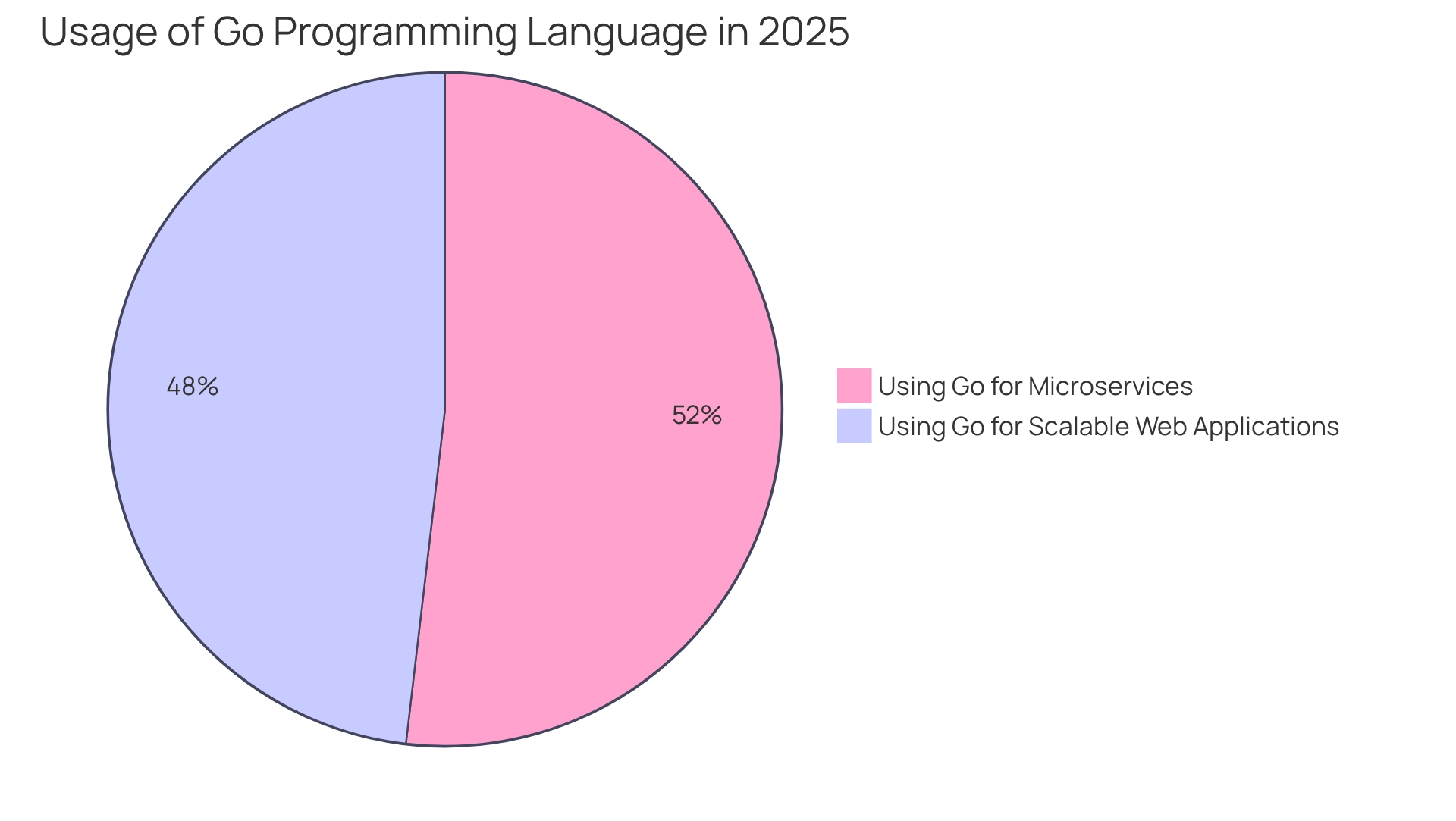
Swift: Key Language for iOS App Development
In the fast-paced world of software development, coding challenges are a common hurdle for many programmers. Swift is a powerful and intuitive programming language developed by Apple, specifically designed for iOS, macOS, watchOS, and tvOS applications. With modern features such as type safety, optionals, and automatic memory management, Swift simplifies the process of writing safe and efficient code. As of 2025, Swift has become the primary language for iOS development, significantly outpacing Objective-C in adoption. Recent statistics indicate that over 70% of iOS applications are now created using Swift, reflecting its increasing popularity among programmers.
Furthermore, Kodezi addresses these challenges effectively. The language's robust ecosystem, featuring frameworks such as SwiftUI, enables creators to design visually stunning and responsive user interfaces. Real-world examples demonstrate Swift's impact on mobile application performance, with many developers reporting enhanced speed and reduced bugs in production. A recent case study emphasized that companies incorporating Swift into their programming processes experienced a 30% improvement in deployment speed and a significant reduction in code-related issues. This aligns with the broader trend of automation in progress, where 50% of companies have adopted automation tools, leading to improved code quality and faster deployment.
In addition, the automated code debugging features can further enhance Swift development by instantly identifying and rectifying codebase issues, offering detailed explanations and insights into what went wrong and how it was resolved. The system ensures adherence to the latest security best practices and improves performance by addressing bottlenecks and refining code formatting. The Kodezi CLI tool also allows teams to auto-heal codebases quickly, streamlining the deployment process and reducing the time spent on pull requests. Expert opinions highlight Swift's benefits, with Apple programmers commending its efficiency and safety attributes.
As one project manager observed, "AI and automation simplify coding, testing, and deployment—shortening timeframes, enhancing code quality, and allowing programmers to concentrate on strategic, high-value tasks." Another programmer highlighted, "Swift's contemporary syntax and safety attributes render it a better option compared to Objective-C, facilitating quicker coding cycles and reduced runtime errors."
In 2025, Swift continues to evolve, with updates enhancing its capabilities and ensuring it remains at the forefront of iOS app development. Additionally, Swift's integration with the Metal API enables programmers to create high-performance graphics-intensive applications, further showcasing its versatility. Mastering Swift, along with tools such as those available, is crucial for developers seeking to utilize the full capabilities of Apple devices. To maximize your Swift programming experience, consider integrating Kodezi's features into your workflow for enhanced productivity and code quality.
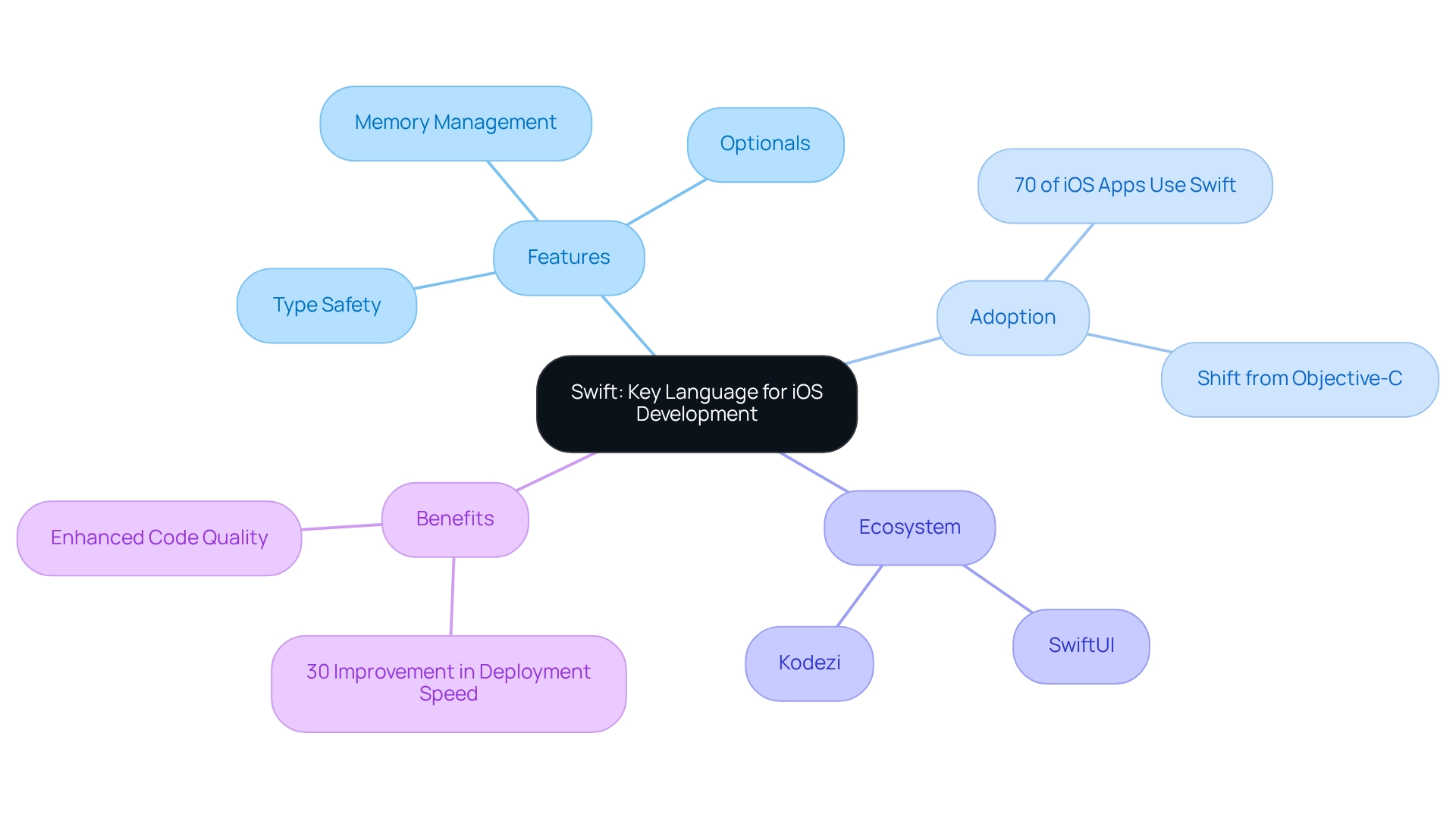
Rust: Safe and High-Performance Language for System-Level Programming
Rust is a cutting-edge systems programming language that prioritizes safety and performance. Its innovative ownership model ensures memory safety without relying on a garbage collector, making it particularly suitable for performance-critical applications. As of 2025, Rust is gaining traction in various domains, including:
- Embedded systems
- Web assembly
- Game development
This highlights the different programming languages and their uses, thanks to its robust community and an expanding ecosystem of libraries, with recent statistics indicating that approximately 20% of programmers are utilizing Rust for performance-critical applications. The language's emphasis on memory safety has garnered positive feedback from developers, who highlight its ability to prevent common programming errors that can lead to security vulnerabilities. Furthermore, recent statistics from GitHub show that Rust has experienced explosive growth in both repositories and community contributions, indicating active development and adoption.
In system-level programming, Rust's performance is further enhanced by its latest updates, which focus on optimizing execution speed and resource management. Case studies demonstrate Rust's effectiveness in developing reliable software, particularly in high-stakes environments where performance and safety are paramount. By 2025, Rust is expected to solidify its position as a preferred choice for developers aiming to create efficient and secure applications, making it essential for those interested in mastering system-level programming.
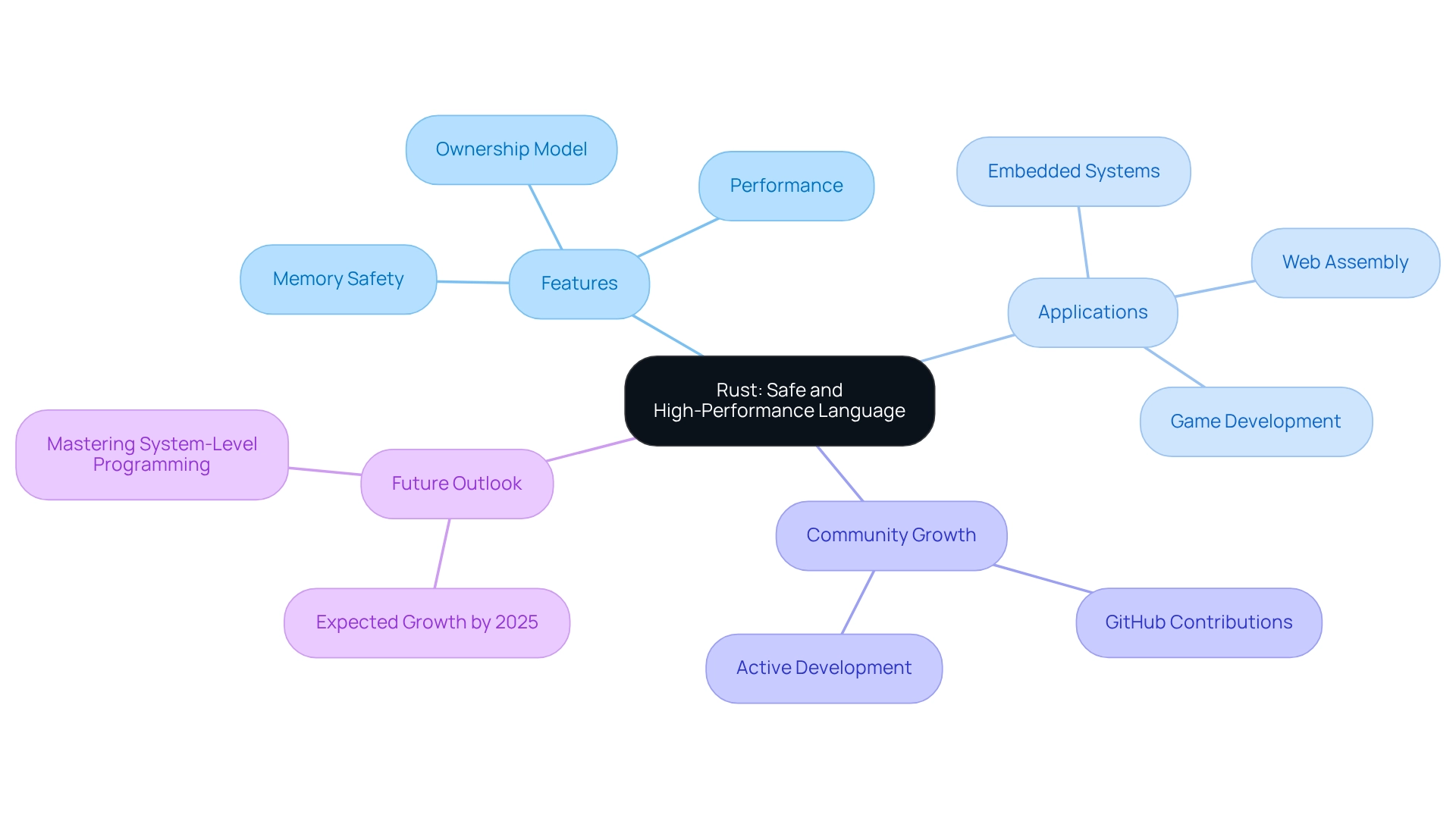
Conclusion
The challenges faced by developers in the realm of coding can be significant. The exploration of various programming languages and tools highlights the diverse landscape of software development and the critical role they play in enhancing productivity and code quality. Each language, from Python to Rust, offers unique strengths tailored to specific applications, whether it be data analysis, web development, or system-level programming. Understanding these nuances is essential for developers aiming to navigate the complexities of modern coding environments effectively.
Innovative tools like Kodezi directly address these challenges by streamlining workflows, automating documentation, and enhancing debugging processes. By integrating such tools into their practices, developers can focus more on feature development and less on routine tasks. This shift ultimately fosters a culture of efficiency and quality. The impact of generative AI in this context cannot be overstated, as it significantly enhances knowledge transfer and reduces onboarding times, proving invaluable in complex project settings.
As the tech landscape continues to evolve, the importance of mastering these programming languages and leveraging advanced tools will only grow. Developers who stay updated with the latest trends and technologies will find themselves better equipped to create scalable, high-quality applications that meet the demands of an ever-changing market. Embracing these advancements not only boosts individual productivity but also positions developers and teams to thrive in a competitive environment. What tools are you currently using to enhance your coding practices? Exploring options like Kodezi could be the next step in your development journey.
Frequently Asked Questions
What challenges do developers face in coding today?
Developers face significant challenges in managing and maintaining APIs, which can hinder productivity and code quality.
How does Kodezi help developers with API development?
Kodezi automates the creation of OpenAPI specifications, streamlining code generation and debugging, allowing developers to focus on feature development rather than documentation.
What is the impact of Kodezi on developer productivity?
Kodezi enhances productivity by automating documentation and debugging, with studies indicating that generative AI can improve knowledge transfer and onboarding by 44%.
What specific features does Kodezi offer for debugging?
Kodezi's robust debugging capabilities quickly identify and resolve issues, fix performance bottlenecks, and ensure that code meets professional standards.
How does Kodezi contribute to maintaining code quality?
By providing automated documentation and debugging tools, Kodezi fosters a culture of quality and efficiency, especially in complex projects.
What are the broader benefits of using Kodezi beyond productivity?
Kodezi not only improves productivity but also helps in minimizing reporting overhead through automated metrics collection, enhancing the effectiveness of AI implementation.
Why is automated OpenAPI specification generation becoming essential?
As the landscape of API development evolves, integrating automated tools like Kodezi is vital for maintaining a competitive advantage in software development.
How does Kodezi address the limitations of generative AI?
While generative AI is helpful, it is least effective when problems become complicated and require a broader perspective, which Kodezi acknowledges in its functionalities.




